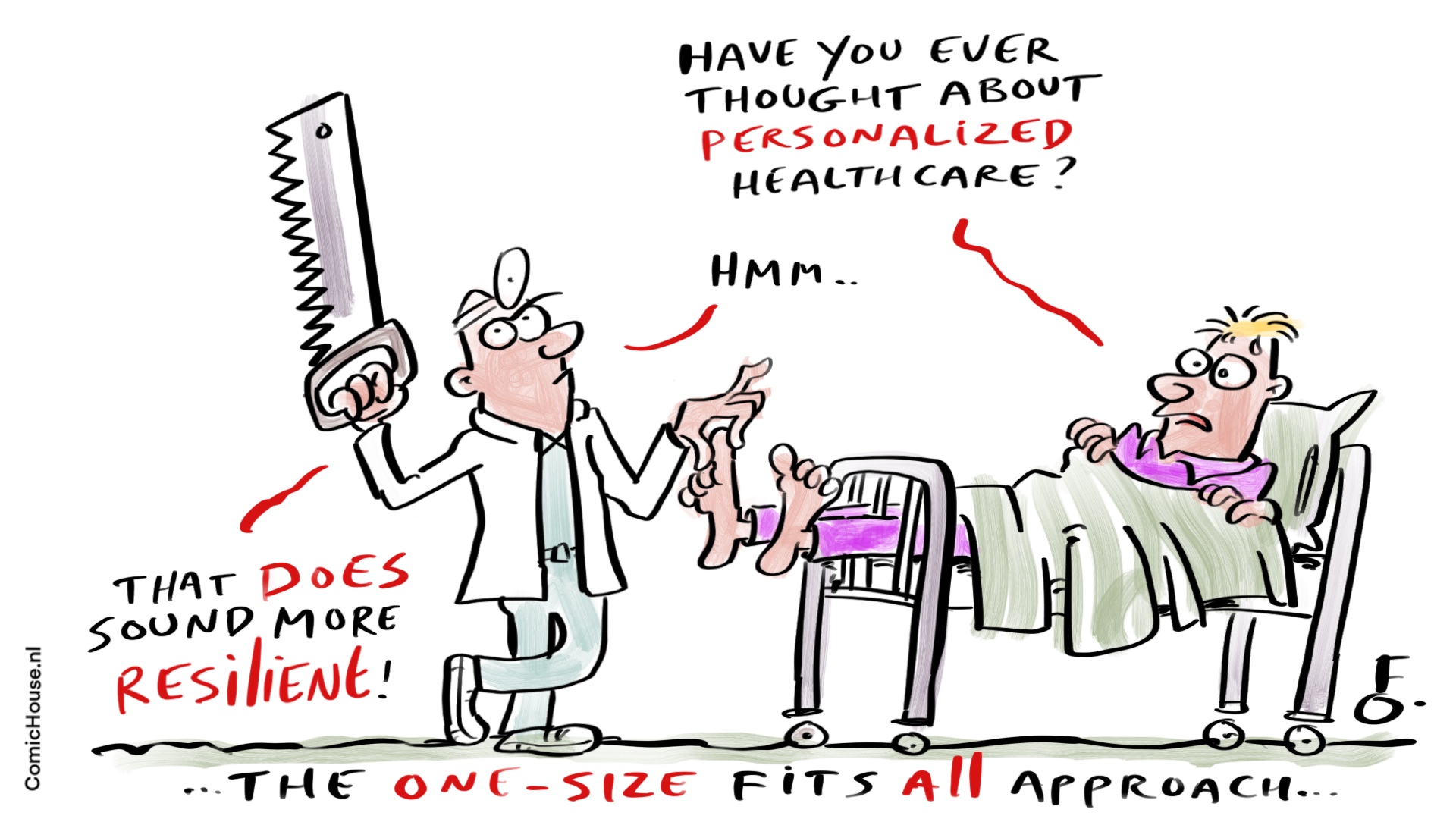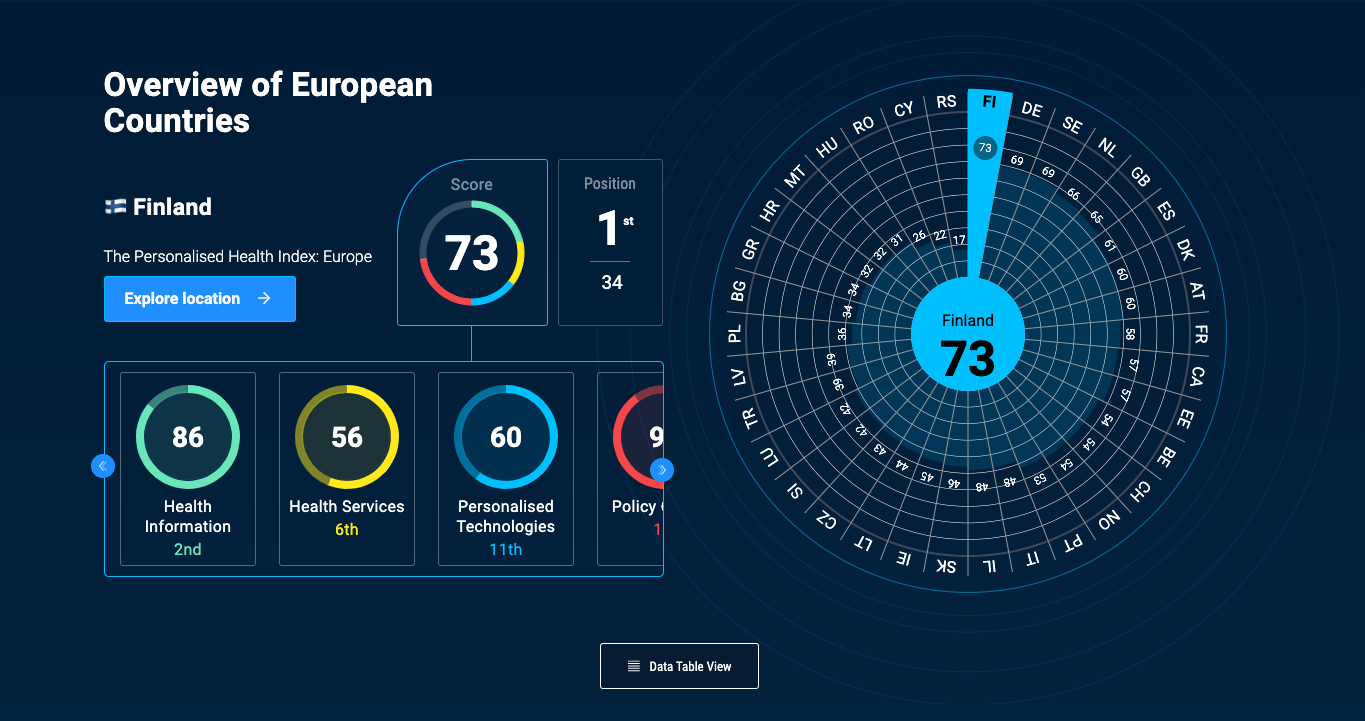Is your country’s health system prepared for the digital, personalised future of health?
Experts agree that optimising digital and personalised healthcare capabilities will be key for countries trying to achieve future-ready health systems.
On 15 October a panel of experts came together with a leading European Commission (EC) representative, to mark the launch of the European Personalised Health Index. These countries were chosen as each represents a best practice example of data-driven personalised healthcare. They are, therefore, best placed to suggest how other health systems across Europe can follow their example and prepare for the digitalised future of health.
Want to explore the European Personalised Health Index before reading the key outtakes from the discussion? Click here to view the regional overview or click here to go directly to Finland's results and explore all the European countries in the Index from there.
Over the coming months, policy makers in Brussels and across Europe, will make decisions that could shape the future of healthcare. The impact of these decisions goes far beyond the policy or administrative sphere. From the survival hopes of someone diagnosed with lung cancer in ten years’ time, to how we manage the next global health crisis, to whether Europe can maintain its place as a global leader in medical science. All of these situations could be impacted by the choices made.
Data-driven personalised healthcare creates healthier populations
At the launch event, Professor Stjepko Pleština opened discussions by reinforcing that for clinicians, data should be the basis of informed decision-making. It drives personalised healthcare, reduces waste, frees up much-needed resources and improves patient outcomes.
Stjepko gave Croatia as an example. In response to very high cancer incidence and mortality rates, steps were taken to improve data-driven personalised healthcare. Subsequently, improvements were seen in patient diagnosis, treatment, mortality and outcomes. As a result, Croatia has become one of Europe’s leaders for precision oncology. Not only is genomic testing of tumours freely available but it is covered by health insurance. This in turn enables a focus on individualised treatments based on genomic profiling.
The Personalised Health Index shows that countries which are early adopters in terms of leveraging health data and digital health perform better across the board. Estonia for example ranks #10, outperforming countries with higher GDP spend on health, and is renowned for investing in digital and data-driven health, including the universal roll-out of electronic health records.
Governments must put frameworks in place to facilitate the collection and sharing of patient data
The panel was in agreement that countries individually, and Europe as a whole, benefit from sharing data. The value of collecting and sharing patient data has been reinforced by COVID-19, with data being used to track the virus’s progress, and identify vaccines and treatments. Stjepko Pleština urged countries to share data across borders, as smaller countries like Croatia depend on data from larger countries to support informed clinical decision-making.
Data literacy, data trust and digital infrastructure are essential
Citizens must be able to access their data, and maintain some control over how those data are used, however. Ceri Thompson gave the example of My Health, My Data, the first open biomedical information network, initiated by the EC to connect organisations and individuals, empower citizens, enable secure data exchange, and define proper legal and regulatory frameworks.
Päivi Sillanaukee made the point that interoperability of data is essential. Päivi called for counties – with the support of the EC – to find a way to create infrastructures to manage the interoperability of data, both within the country and on a Europe-wide basis. This would require a legislative and policy framework, and where necessary policy reform, to enable countries to build on existing digital services.
Best practice sharing allows countries to learn from each other and accelerate progress
The panel discussed the value of the Personalised Health Index, in enabling country and regional comparisons to identify and showcase best practice and accelerate progress towards personalised healthcare.
Country-level disparities are highlighted by the Index, leading Ceri Thompson to observe that countries are at different starting points. There are many different levels of data digitised, different resources, governance, inherited characteristics and cultures. As a result, Ceri commented, “This Index is valuable because it helps direct investment to where it needs to go depending on the profile of that country.” Everyone, from the strongest performers to the weakest, have opportunities to improve.
What makes Finland #1?
Päivi Sillanaukee was called on to explain why Finland ranks #1 in the Personalised Health Index. Päivi highlighted high public digital literacy and willingness to share data (driven by open dialogue to explain how and why data will be used). She also pointed to secure data transfer processes and country-wide digital infrastructure which ensure interoperability, and a legislative framework which is constantly improved.
The time has come to reimagine health systems to be future-ready
To achieve long-term resilience health systems must move away from a one-size-fits-all approach, and embrace innovation, and decision-making based on data and evidence.
Decision-makers should incentivise prevention and shift focus from burden of disease and delivery of clinical services to societal benefit and helping people live longer, healthier lives. Päivi Sillanaukee comments, “this approach is seen in Finland. We focus not just on data-driven personalised healthcare and medicine, but also the delivery of personalised social services and incentivising lifestyle changes to improve health.”
Ceri Thompson reinforced the need to maintain a balance between sharing data to improve patient outcomes and privacy. Ceri suggested that the EC work closely with member states to facilitate the digital transformation of health and create good ecosystems for the private and public sector, to develop solutions while maintaining that balance.
Bold changes to regulatory systems and data health rules are needed
The time has come to make changes that not only create healthier populations, but also drive fairer access and lower costs to society. These include bold changes to our regulatory systems to unlock a new era of digital health. With that aim in mind, a panel of independent experts - including patient representatives, academics, doctors, policy-makers and ethicists - created the Personalised Health Index. A first-of-its-kind resource providing the data and insights needed to track our progress towards a better, healthier future.
When asked what he felt to be the most pressing need, Stjepko Pleština responded that “while governments are struggling with COVID the focus on personalised healthcare is low. We need to make personalised healthcare a priority again and put patients at the centre.” For Päivi Sillanaukee, it is imperative to ensure cross-border data-sharing is facilitated, reinforcing that “we need to keep trying to have a Europe where data flows across borders, while respecting the rule of law and people’s privacy.” As a representative of the EC, Ceri Thompson was clear that “the digital transformation of health is a societal project and we all need to be involved.” Ceri urged participants to “think about what you can do, and perhaps use tools like the Personalised Health Index to start or join the conversation.”
For Padraic Ward, Head of Pharma International, Roche, the need for drastic change was clear, with his hope that “perhaps future generations will say that 2020 was the year the healthcare revolution in Europe started”.
Ready to look into the data of the European Personalised Health Index?
Click here for an overview of the European Personalised Health Index. From there you can view the data of individual countries in the index, by clicking on "Explore Location" or click here to go directly to Finland's results and explore from there.
Watch the full discussion here:
Do you agree with the solutions put forward by the panel? Do you have a suggestion to share? Use #FutureHealthLive to join the discussion on Twitter. Follow us on Twitter and LinkedIn for the latest updates from the FutureProofing Healthcare initiative.















